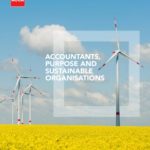For years, accountants have dabbled at the edges of sustainability. Their response to climate change and the growing effect it has on corporate performance has been, in the words of one prominent accountant, a bit like a rabbit caught in the headlights.
As long as the larger or more enlightened companies produced some kind of corporate social responsibility report, the accountancy profession thought the issues were being covered. It was a way of deftly sweeping everything under the nearest bit of carpet.
But the year-long work of The Prince of Wales Accounting for Sustainability Project has altered perceptions. Accountants now have a framework they can use.
The projects report, published just before Christmas, provided a full guide to the whole range of measures and frameworks required. For the first time, business and the public sector have a simple and clear framework on which to base their sustainability efforts.
Based on the development of best practice, it provides a comprehensive range of guidance on how to embed sustainability within an organisation and it provides a website that acts as a toolkit to aid that effort.
It also creates a connected reporting framework that will enable companies and other organisations to report sustainability information alongside the traditional and more conventional financial information, so that a more rounded and balanced picture of an organisations performance can be given.
During the project, several companies, including HSBC, Aviva and EDF Energy, trialled the framework and decided to take it on as part of their normal reporting process.
It marks a point where sustainability information and the effect it has on corporate performance becomes a central part of financial and corporate reporting. It is very important to put it into the mainstream, says Lord Sharman of Redlynch, chairman of Aviva and formerly chairman of KPMG, the accounting firm.
We will be using this framework in our main report and accounts for 2007. Corporate reporting gets longer and longer. You need to have a simple and useful report combining financial and non-financial information.
Speaking at the launch of the report, Sir Michael Rake, another one-time chairman of KPMG and now chairman of BT, announced that it too would incorporate the framework into its annual report.
The pace at which sustainability issues have moved up the priorities of both the private and public sector is quickening and is being driven from both inside and outside the organisations.
Companies now consider being sustainable more of a business priority than a means of persuading the public that they are doing good things.
It has become an important issue when recruiting the best graduates into the organisation, for example. It has become a key issue with customers, particularly in the retail sector.
And this is likely to become a big factor in the public sector as well. Last April, the National Audit Office, (NAO), reported that 85 per cent of public sector building projects largely ignored the governments sustainability guidance.
Michael Whitehouse, assistant auditor-general at the NAO, was a member of The Prince of Wales Project. If this is going to work in reality, he says, you need to have greater transparency in how government departments and agencies take decisions.
But for him, in the same way that customers at supermarkets demand lower food miles and fewer plastic bags, it will be pressure from the public that will force the change. The real catalyst for change, he says, is the wider public. They are expecting public sector bodies to be sustainable.
This is also the wider challenge for the accountancy profession as a whole. In the past, embedding sustainability in corporate performance has been down to a little empire of corporate social responsibility at HQ, says Lord Sharman. This is very different. This is about getting sustainability embedded down the line. This needs to be just something we do automatically, he says.
But to do this, there needs to be a change within the accounting profession, not just companies and public sector organisations. The connected reporting format is a great start, says Jan Babiak, managing partner, regulatory and public policy, at Ernst & Young.
Id like to see the accounting profession move aggressively forward with the market to set a common standard that is applicable on a global level. And for John Hegarty, head of the Centre for Financial Reporting Reform at the World Bank, the same is true.
If the tenets of the Accounting For Sustainability report can be made an integral part of general purpose reporting, then it can be embedded into normal management systems, he says.
Successful reform requires buy-in from policy makers who truly understand why this matters.
Following on from its report, the Accounting For Sustainability Project is to continue under the auspices of both The Prince of Wales and the main accountancy bodies.
It will continue to support, promote and develop the models outlined in the report, says Paul Druckman, who chaired the reporting sustainability strand of the project.
Ensuring that the pace of change is maintained is important. For Jan Babiak and Michael Whitehouse, for example, it is clear that this has to happen.
It is simply a question of when we will invest in this, says Ms Babiak, either now in inspiration, or later in desperation.
Its like the womens suffrage movement, says Mr Whitehouse. There is an inevitability about it. Its not going to go away.
Robert Bruce was on the board and the steering committee of The Princes Accounting for Sustainability Project



